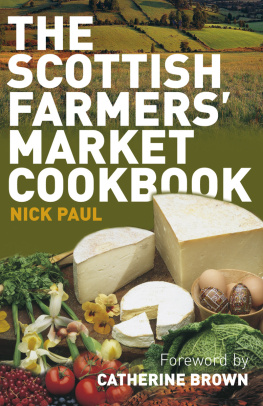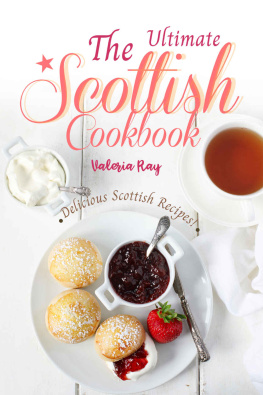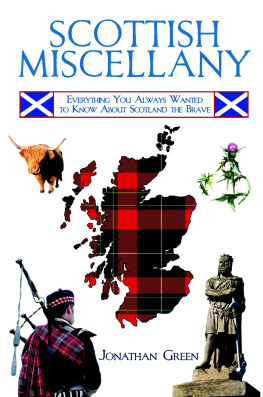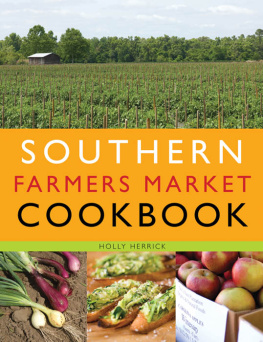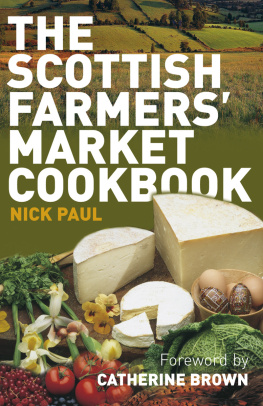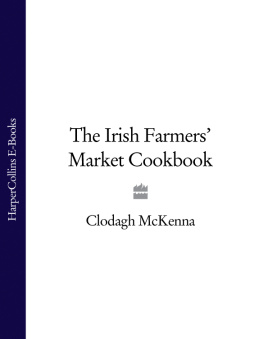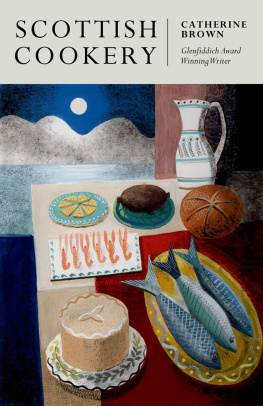CONTENTS
Potato Omelette
6. Cakes and Slices
FOREWORD
W here does your food come from? Whos grown it, harvested it, processed it and is now selling it? You see it on the supermarket shelf looking in its prime, neatly labelled and carefully packaged. But whos actually produced it? Is it a local farmer with a small crop of, say, a traditional apple variety which only lasts for about four weeks in autumn? Probably not. Chances are, the apples have been trucked (or flown) halfway round the world at below zero temperatures possibly picked unripe from sources which can reliably keep the shelves filled throughout the year.
In the second half of the 20th century this highly sophisticated retailing system may have revolutionised the food we eat, but it has also divorced the food buyer from the farmer and producer. The scandal of BSE in the late 90s further compounded this gulf. So today, if you care about where your food comes from whos grown it, harvested it and is now selling it the better place to look is not on the supermarket shelf but at your local farmers market.
For its here that you can sense again the natural seasons; have a friendly face to answer your questions, knowledgeably, about where and how the food has been produced; and also feel the joy of freshness which is an inspiration to get into the kitchen and start cooking.
For centuries before the modern retailing revolution market produce led and inspired cooks. And for farmers and their wives market day was a vital part of their weekly routine. Taking whatever produce was ripe and ready for sale to market, it was their day out; a time to socialise with friends or have a bit of fun once everything had been sold and gather at an inn for some convivial drinking as Robert Burns so vividly brought to life in Tam oShanter.
The revival of the old farmers markets have brought back life and fun to town and city streets. They have made a vital reconnection with the land and its produce. All that remains is that buyers are inspired to cook, which is why I welcome this timely book.
Catherine Brown
INTRODUCTION
T he Farmers Market Philosophy fresh Scottish produce, sold in season and sold by local producers! Its as simple as that.
It is so easy today to create meals by shopping at Farmers Markets, which provide all the best in vegetables, meat, game, poultry, fish, eggs, fruit, jams and more. You can find ingredients that have all the true flavour and goodness of fresh produce rather than the brightly-coloured, chilled and re-packaged goods found in the supermarkets, that promise so much but often fail to deliver.
Scotland has an enviable reputation for producing some of the finest foods in the world: nearly all the langoustines eaten in Spain are from the West Coast of Scotland; Scottish Aberdeen Angus has long been the byword for quality meat; Scottish raspberries and tayberries are arguably the finest available and so the list goes on! Local growers and producers are supplying Markets from the Borders up to Orkney, as indeed they have for hundreds of years.
There is now a movement away from the global produce offered by the supermarkets and a return to the seasonality of food. People are once again realising that, for example, fresh Brussels sprouts crunchy, sweet and straight from the stem are a wonderful vegetable accompaniment. Quickly cooked for a few minutes in a wok with a little sesame oil, they are worlds away from the grey, flavourless overcooked school dinner horrors of the past!
Farmers Markets in Scotland combine a greengrocer, butcher, garden centre, off-licence, game dealer and delicatessen, craft shop and more, bringing them all under one roof. The produce available includes homemade meat pies; wild, fresh line-caught fish; oat cakes and biscuits with the flour milled by water wheels; honey, herbs and cheese. You have the opportunity to speak to the farmer or producer about their passion for bringing the finest stock to the Market and they will happily offer suggestions and tips for getting the best out of the goods. If you are unsure about the meaning of the term organic or if you only know one way to cook sausages, at the Market, there is always helpful advice on hand from the producers themselves.
Today, agriculture is moving away from the intensive practices of recent years. Although there is still a place for mass-produced products, many farmers are looking towards quality produce and small scale production methods, and are utilising natural fertilisers and pesticides wherever practical. For example, farms are growing potatoes with chicken manure as fertiliser. Similarly, weeds are being kept under control by turning the soil instead of automatically spraying, or using biological methods of pest control. This re-emergence of free-range practices focuses on and ensures the health and well-being of livestock. Animals are being given more space to avoid overcrowding and so, by the simplest of means, the spread of disease is reduced. Rare breeds are also being reintroduced, as people recognise the great taste and high quality that they provide, which has been all but lost from the mass-produced herds.
Intensive chemical farming, once promoted as the saviour of cheap food, is becoming a thing of the past as we turn more and more towards the quality of the food, realising that the cost is no longer prohibitive. The benefit to the environment is also apparent, as fewer chemicals are allowed into the water table and pollutants are reduced this benefits both wildlife and the public as a whole.
It is also difficult to balance the demand for organic produce with, for example, the argument of the green mile. That is, it is fine to have an organic bean along with its perceived better taste but, if the beans have to be imported from as far away as South Africa or South America, the cost in terms of distribution surely outweighs the benefits of the produce. Buying locally grown and produced items firstly reduces the need for transportation, so the process is less harmful to the environment in terms of the amount of distribution required. There are benefits for the actual livestock as well, as this decrease in the transportation process lessens the stress on the animals. In addition, localised production processes ensure the safety of local employment.
Shoppers insisting on organic produce quite often fail to understand that there are still chemicals and pesticides used in the production of these goods. However, these are usually specific chemicals which have been approved for use by the Soil Association. The labelling may say one thing but, speaking to the farmers, you may be surprised to find that many of the methods employed are in fact equivalent to organic methods. It often turns out that the farm has elected not to go wholly organic in practice for reasons such as stocking processes or packing.
Imported fruit and vegetables are very often the choice of supermarkets because they need varieties that have thick skins for handling, or are able to be harvested un-ripe for transportation in gas-filled containers that artificially ripen the stock enroute to the warehouses. The quality of food depends on more factors than simply if a pesticide or chemical has been used in its production. You should always look for mature, ripe and fresh produce.
The same applies with meat or fish. If the producer can tell you the age of the lamb or venison, or if the fish is freshly caught, where it came from and when landed, this ensures the consistency and guarantee of quality. Farmers at Farmers Markets are interested in more than simple shelf-life of goods. They will bring to Market sufficient produce to sell that day, often producing or harvesting their stock just a day or so before. This means that no extended storage times and no unnecessary preservatives are used in the production process. Again, this reinforces the farmers intention that, with the minimum of fuss, the produce is fresh and ready for the table.

